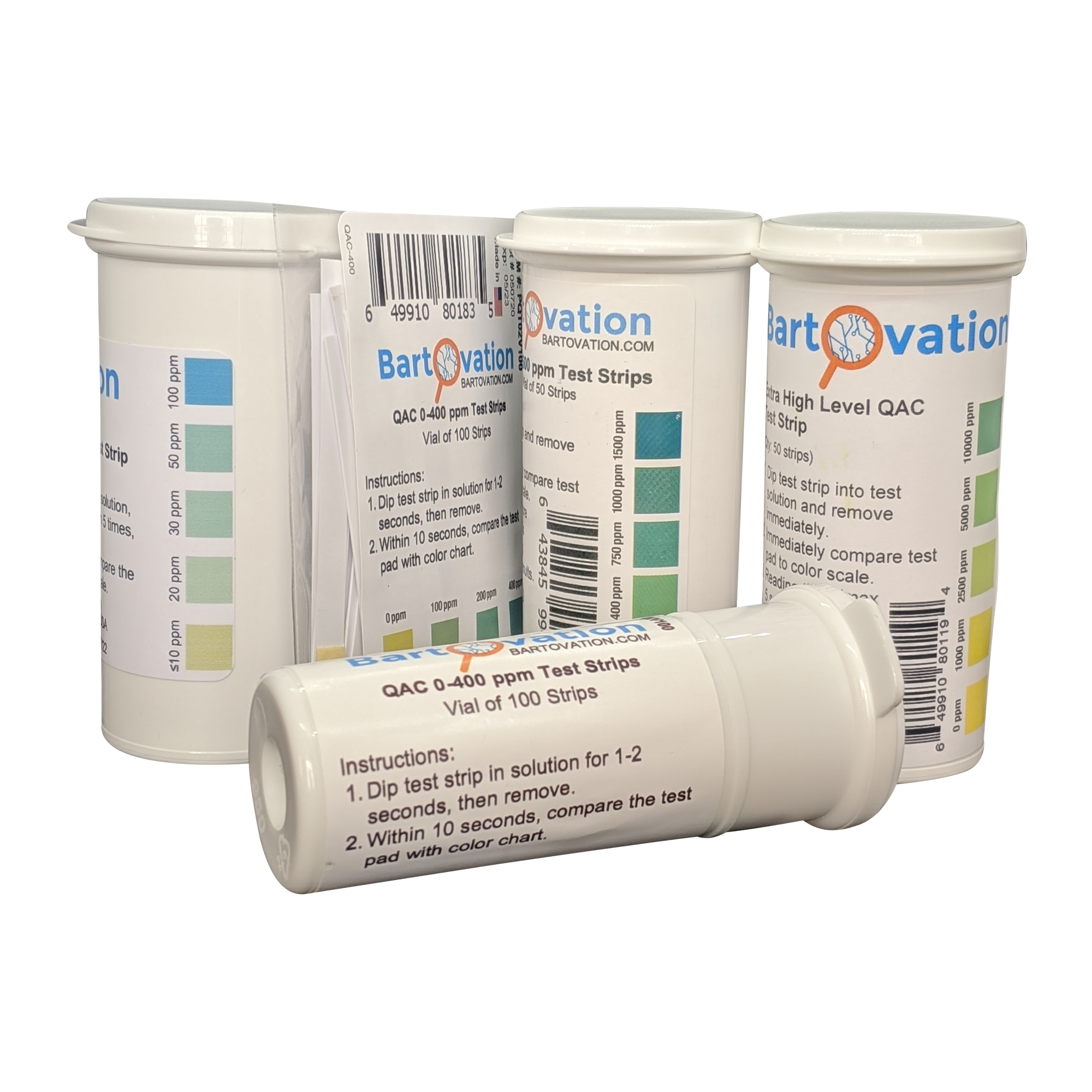The utilization of chemical sanitizers that are regularly tested in restaurants is something that is often required by federal and local regulations. Without test strips it is impossible to know if your sanitizer is diluted correctly and in the proper concentration. Some health departments require a combination of both heat and chemical based sanitation, but, at Bartovation our expertise is with chemical sanitation so we will focus on that here. These regulations are designed to promote food safety and protect you and your customers. As a result, it is important to comply.
In addition to complying with regulations, it is important to test sanitizers regularly because:

-
- Sanitizing chemicals deteriorate over time. As a result, even if you mix the correct ratios your undiluted sanitizer may not be the same strength as it was originally advertised.
-
- Food and cotton fibers reduce the strength of sanitizers. This is especially a concern with wiping cloths in sanitizer buckets because even if the sanitizing solution was initially correct overtime it decreases and your wipes may no longer have the sanitizing agent at the level required for both compliance as well as keeping your customers safe.
-
- Dishwashers may appear to be working properly, but they may not properly dose sanitizers. This results in dishes and cookware potentially not having enough sanitizer or having substantially more than recommended.
You can see our full range of restaurant test strips here.
Every time a sanitizing solution is made we recommend testing to ensure proper strength. Concentrations required as well as any temperature requirements for the water used will vary between jurisdictions. Some health departments specify how often you should check the concentration and others may not. If it isn’t specified, be sure to check often enough to ensure the proper concentration at all times. Testing twice a day is usually the minimum recommended. It is also important to note that as the sanitizing solution becomes dirty it loses its effectiveness. We recommend testing frequently utilized three compartment sinks or buckets every 2-4 hours.
There are three major chemical sanitizing agents utilized in the restaurant industry: chlorine, quaternary ammonia compound (often referred to as QAC or QUAT) and iodine. It is important that you use the Bartovation test strip that corresponds to your sanitizing agent, as they are not compatible with other sanitizers. For example, if your sanitizer is chlorine based you MUST use a chlorine test strip to get an accurate reading.
Bartovation tests are generally accepted by health departments and they have been used for years in the food service industry. Sanitizer tests are available in plastic or paper strips or in roll format. Select the format that is preferred by your team. You can see our full range of restaurant test strips here.
Quaternary ammonia tests will often create foam and small bubbles when filled. For most accurate results do not dip the strip through or into the foam, either wait for the bubbles to disappear or test in a portion of the bucket or sink where there is only water.
Every sanitizer test kit made and sold by Bartovation has the instructions for use printed right on the label. This way, whoever is administering the test and wherever your testing is done they have everything they need to get an accurate reading. It is important that no matter what you are following the instructions and timing recommendations on the label closely.
Some other recommendations we have for sanitizer testing include:

-
- Test all of your sanitizers before use including but not limited to dish watching machines that use chemical sanitizer, sanitizing buckets with wipes, and three part sinks.
- Always know where your test strips are and make sure your managers and warewashing are well trained in using sanitizer test strips. Inspectors will ask you show them your strips and oftentimes have you do the test. If you do not know how they can mark down your inspection score.
- Make sure the test strips you have on hand are current and have not expired. Also make sure they are designed for testing the same kind of chemical sanitizer you are utilizing.
Specializing in development of pH, sanitizer, water quality, and chemical test strips, Bartovation prides itself in consistently being on the cutting edge of the industry with many proprietary technologies and formulations. We help individuals, foundations and enterprises comply with regulations and test their products to ensure quality and consistency.
